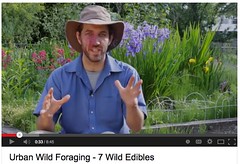The F-word, an essential element of Herbalism
The F-word, an essential element of Herbalism
or Why Gathering and Making Your Own Herbal Remedies is Important
Hello,
Have I got a treat for you! I'm really excited to share this with you because it's hot off the presses. Well, it's hot out of the editing room...
 This is the Official Public Release of Episode # 3 of Urban Wild Foraging with Garliq - 7 Wild Edibles.
This is the Official Public Release of Episode # 3 of Urban Wild Foraging with Garliq - 7 Wild Edibles.
As I said a year ago when we released Episode #1 - Nettles, the editing has been slow. But I think you'll agree that these videos are great. My co-conspirator, Angela, has done a fantastic job from her camera work right through to the finished product.
In this episode, we visit my community garden in east Vancouver to see what wild edibles we can find outside of the garden plots.
In practically no time at all, we found 7 wild edibles! (that you'll find in practically every community garden in town)
So yes, as you've likely caught on to at this point...
the F-word is Forage.
And just before we get to the video, I want to share the top 7 reasons that foraging for food and medicine is extremely important.
7 advantages of foraged foods and medicines...
-
Absolutely no need for fertilizers or pesticides when you forage "weeds." These little green friends not only survive, but often thrive in areas that could not support a garden.
-
More nutritious than many organic veggies, which is amazing when you consider the idea "healthy soil grows healthy foods." Most of us would agree with that, I expect. But wild plants are not only able to find the nutrients and minerals they need, but find more of them than the plants in your average garden.
-
Weeds improve soil in the places where they grow. By contrast, industrial agriculture depletes the soil. Even organic farming on a large scale requires frequent inputs to keep soil healthy. But wild plants always find a way to grow. And they always leave it better than they found it.
-
Plants don't produce chemicals that are harmful to the ecosystem. the chemicals that wild plants produce are familiar to the ecosystem, they easily decompose without harming the health of the ecosystem. Again this is a contrast to pharmaceutical chemicals that continue to impact an ecosystem for weeks or years after first contact.
-
No fossil fuel use! You can't get more local than foraging weeds in the city. No need for trucks, trains, and tankers when you can just walk your food home.
-
You can ensure love and respect are shown to the living plant before it becomes ... well, you. I suspect that most of you agree that you find food more nourishing and more delicious when you know it's been loved all the way from field to fork. This can't be measured with a machine, but it has a very real impact on your health and enjoyment.
-
You actually get the herb you want at the quality you expect. This is not always the case with commercial herbs, especially if they're wildcrafted. A 2013 study of 12 different suppliers here in Canada, showed that 1/3 bottles "were not what they claimed to be, and that pills labeled as popular herbs were often diluted — or replaced entirely — by cheap fillers like soybean, wheat and rice." (there'll be a whole article on this in the next few weeks)
You can chew on these points as you watch this 8 minute video.
Enjoy :)
And if you'd like to share a foraging story, I'd love to hear (and so would everyone else). Please share that here.
"Didn't I hear something about a Course that Teaches Foraging?"
Yes, you did.
And if you liked that little taste, you'll love the Herbal Integration Course. In this course, you'll learn about many aspects of wild foods and medicines. You'll gather them, eat them, ferment them, cook them, make medicines with them and teach others about them.
You'll also learn how to use to heal using the medicines you handcrafted.
To learn more, click here --> Herbal Integration Course
strength & wisdom.
garliq
PS. The class is almost half full with the Early Bird Deadline - to save $150 - coming up this Sunday Feb. 9th (end of day). If you're interested, but you have questions now is the time to ask them. Submit your application with your questions to ensure you get the discount and we'll start a conversation. Apply here --> http://www.urbanherbschool.ca/courses/herbal-integration-course-2014
PPS. I'm not a high pressure sales guy :) I want to make sure this class is a good fit for you and your learning goals. I also really enjoy authentic human interactions, this email format still feels a bit funny to me.
